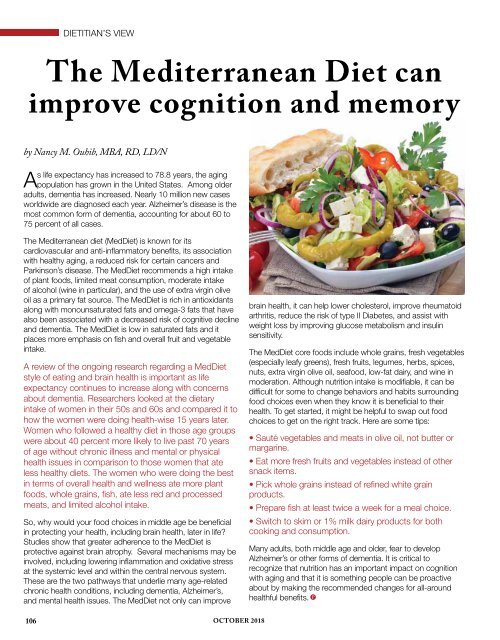Create successful ePaper yourself
Turn your PDF publications into a flip-book with our unique Google optimized e-Paper software.
DIETITIAN’S VIEW<br />
The Mediterranean Diet can<br />
improve cognition and memory<br />
by Nancy M. Ouhib, MBA, RD, LD/N<br />
As life expectancy has increased to 78.8 years, the aging<br />
population has grown in the United States. Among older<br />
adults, dementia has increased. Nearly 10 million new cases<br />
worldwide are diagnosed each year. Alzheimer’s disease is the<br />
most common form of dementia, accounting for about 60 to<br />
75 percent of all cases.<br />
The Mediterranean diet (MedDiet) is known for its<br />
cardiovascular and anti-inflammatory benefits, its association<br />
with healthy aging, a reduced risk for certain cancers and<br />
Parkinson’s disease. The MedDiet recommends a high intake<br />
of plant foods, limited meat consumption, moderate intake<br />
of alcohol (wine in particular), and the use of extra virgin olive<br />
oil as a primary fat source. The MedDiet is rich in antioxidants<br />
along with monounsaturated fats and omega-3 fats that have<br />
also been associated with a decreased risk of cognitive decline<br />
and dementia. The MedDiet is low in saturated fats and it<br />
places more emphasis on fish and overall fruit and vegetable<br />
intake.<br />
A review of the ongoing research regarding a MedDiet<br />
style of eating and brain health is important as life<br />
expectancy continues to increase along with concerns<br />
about dementia. Researchers looked at the dietary<br />
intake of women in their 50s and 60s and compared it to<br />
how the women were doing health-wise 15 years later.<br />
Women who followed a healthy diet in those age groups<br />
were about 40 percent more likely to live past 70 years<br />
of age without chronic illness and mental or physical<br />
health issues in comparison to those women that ate<br />
less healthy diets. The women who were doing the best<br />
in terms of overall health and wellness ate more plant<br />
foods, whole grains, fish, ate less red and processed<br />
meats, and limited alcohol intake.<br />
So, why would your food choices in middle age be beneficial<br />
in protecting your health, including brain health, later in life?<br />
Studies show that greater adherence to the MedDiet is<br />
protective against brain atrophy. Several mechanisms may be<br />
involved, including lowering inflammation and oxidative stress<br />
at the systemic level and within the central nervous system.<br />
These are the two pathways that underlie many age-related<br />
chronic health conditions, including dementia, Alzheimer’s,<br />
and mental health issues. The MedDiet not only can improve<br />
brain health, it can help lower cholesterol, improve rheumatoid<br />
arthritis, reduce the risk of type II Diabetes, and assist with<br />
weight loss by improving glucose metabolism and insulin<br />
sensitivity.<br />
The MedDiet core foods include whole grains, fresh vegetables<br />
(especially leafy greens), fresh fruits, legumes, herbs, spices,<br />
nuts, extra virgin olive oil, seafood, low-fat dairy, and wine in<br />
moderation. Although nutrition intake is modifiable, it can be<br />
difficult for some to change behaviors and habits surrounding<br />
food choices even when they know it is beneficial to their<br />
health. To get started, it might be helpful to swap out food<br />
choices to get on the right track. Here are some tips:<br />
• Sauté vegetables and meats in olive oil, not butter or<br />
margarine.<br />
• Eat more fresh fruits and vegetables instead of other<br />
snack items.<br />
• Pick whole grains instead of refined white grain<br />
products.<br />
• Prepare fish at least twice a week for a meal choice.<br />
• Switch to skim or 1% milk dairy products for both<br />
cooking and consumption.<br />
Many adults, both middle age and older, fear to develop<br />
Alzheimer’s or other forms of dementia. It is critical to<br />
recognize that nutrition has an important impact on cognition<br />
with aging and that it is something people can be proactive<br />
about by making the recommended changes for all-around<br />
healthful benefits. P<br />
106<br />
OCTOBER <strong>2018</strong>





